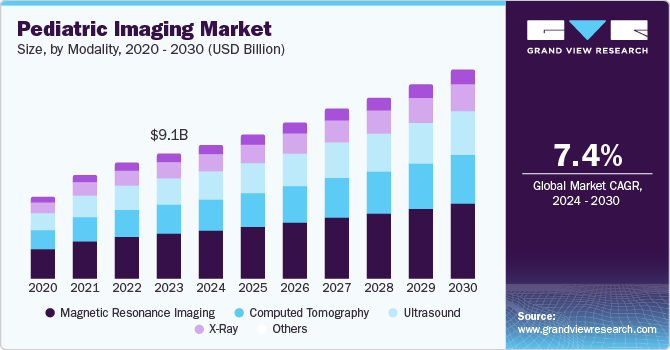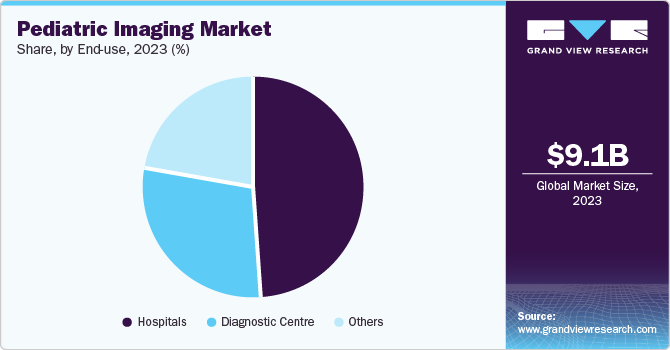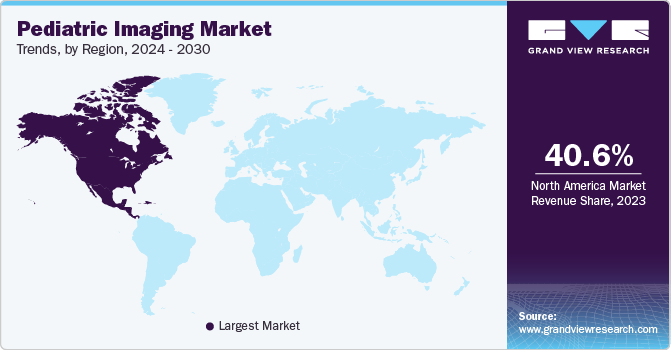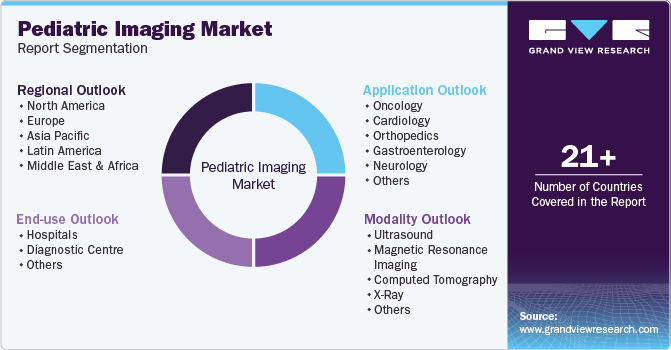
Pediatric Imaging Market Size, Share & Trends Analysis Report By Modality, By Application (Oncology, Cardiology, Orthopedics, Gastroenterology, Neurology), By End Use, By Region, And Segment Forecasts, 2024 - 2030
- Report ID: GVR-4-68038-185-6
- Number of Report Pages: 100
- Format: PDF, Horizon Databook
- Historical Range: 2018 - 2022
- Forecast Period: 2024 - 2030
- Industry: Healthcare
Pediatric Imaging Market Size & Trends
The global pediatric imaging market size was valued at USD 9.06 billion in 2023 and is projected to grow at a CAGR of 7.4% from 2024 to 2030. Some of the key growth drivers for this market are the increasing prevalence of cancer and other chronic diseases in children worldwide and the rising need for adequate imaging technology for the diagnosis of multiple diseases and health intricacies. Increasing application of pediatric imaging technology in areas such as cardiology, orthopedics, gastroenterology, neurology, and more are expected to develop growth for this market during the forecast period.

Growing new cases of congenital disabilities or congenital anomalies in infants, rising prevalence of premature births, and other adverse perinatal outcomes have developed an increase in the use of technologies such as pediatric imaging. In March 2023, the Pan America Health Organization (PAHO) estimated that as many as 303,000 newborns die every year due to congenital abnormalities during the first few weeks after birth.
An increase in cardiac health issues experienced by infants or children in adolescence has resulted in a growing requirement for advanced radiological technologies for errorless diagnosis and the right treatments. The amount of radiation used during diagnosis through imaging has a lasting impact on children's health. This develops demand for innovation-based technologies that can identify the suitable amount of radiation to use and avoid unnecessary exposure.
Excessive resistance, unwillingness to get through the diagnosis procedure, and the inability of children to specifically explain the problem develop challenges for health professionals in using imaging techniques while diagnosing. This has led to the need for precise technologies related to pediatric imaging. In addition, the growing incidence of injuries has also contributed to the increasing demand for this market. According to the World Health Organization (WHO), the leading cause of demise of children aged five or over is unintentional injuries.
Modality Insights
Based on modality, the Magnetic Resonance Imaging (MRI) segment accounted for the largest revenue share of 35.0% in 2023. This segment is primarily driven by the use of this technology in the diagnosis of multiple health problems associated with areas such as the brain, abdomen, chest, pelvis, and others. The non-invasive nature of the technology, painless procedures, and safety are some of the other factors that contribute to the growing use of it. In addition, rising new cases of injuries in children and the prevalence of multiple health intricacies related to bones, muscles, tissues, organs, and other significant body elements are expected to drive demand for this segment in the approaching years.
The ultrasound segment is expected to experience a significant CAGR during the forecast period. It is attributed to features offered by the modality, such as convenience, cost-effectiveness, and enhanced safety. In addition, technological advancements such as functional and anatomic ultrasound have grown in adoption in this segment in recent years. MRIs are characterized by prolonged exposure to radiation and lengthy examinations in some cases, so the ultrasound segment has been experiencing rising usage for diagnosis and treatment.
Application Insights
The orthopedic application segment dominated the global industry for pediatric imaging in 2023. The aspects such as growing new cases of unintentional injuries, involvement of children in unceasing road accidents, sports injuries, growing participation in outdoor activities, rising prevalence of chronic health problems in children related to joints, bones and muscles, increasing congenital abnormalities, limb deformities primarily drive growth of this segment. Rising diagnostic assistance required by the pediatric orthopedists and adoption of technologically advanced imaging technologies by the healthcare providers is expected to generate greater growth for this segment in approaching years.
The gastroenterology application segment is projected to experience the fastest CAGR from 2024 to 2030. This is attributed to multiple factors such as the increasing occurrence of viral, parasitic, or bacterial infections, rare cases developed through toxic chemicals, incorrect medications, use of illicit drugs, and unceasing fecal-oral transmissions. Some commonly used imaging technologies for diagnosing gastric conditions in children are upper gastrointestinal (UGI), computed tomography (CT), ultrasound, fluoroscopy, and others. The unavailability of safe drinking water and continuous exposure to harmful chemicals through food and beverages have been causing a rise in related health issues. According to UNICEF, nearly 600 million children lack safe drinking water, 669 million do not have access to basic hygiene amenities, and approximately 1.1 billion are experiencing a lack of safe sanitation. These aspects are expected to develop growth for the gastroenterology application of pediatric imaging in the approaching years.
End Use Insights
Based on end use, the hospital segment held the largest global pediatric imaging market revenue share in 2023. Growth of this segment is driven by aspects such as the increasing adoption of innovative imaging technologies and equipment by hospitals, the growing trend of placing dedicated pediatric diagnosis and treatment departments, enhancements of healthcare infrastructure in multiple countries worldwide, and rising investments by renowned facility owners and services providers in pediatric imaging technologies.

The diagnostic centers segment is expected to experience the fastest CAGR during the forecast period. This is attributed to factors such as the rising number of pediatric diagnostic centers in multiple countries, enhanced assistance initiatives, and aerosolized service approach adopted by these centers, leading to growing demand and ease of accessibility as compared to multi-department hospitals, which usually involve prolonged processes of admissions and higher costs.
Regional Insights
North America pediatric imaging market dominated the global industry and accounted for revenue share of 40.6% in 2023. This market is primarily influenced by factors such as increasing new cases of premature births, congenital malfunctions, a growing number of sports injuries in children, rising cases of viral or bacterial infections leading to gastrointestinal issues, an unceasing rate of growth in childhood cancer, and more. Advancements in the technology used by pediatricians and government initiatives to ensure improved children's welfare are also expected to drive growth for this regional market in the approaching years.

U.S. Pediatric Imaging Market Trends
The U.S. pediatric imaging market accounted for the largest revenue share of the regional industry in 2023. This market is mainly driven by factors such as the unceasing prevalence of pediatric diseases, growing premature births, rising childhood cancer cases in the country, supporting government initiatives, and the presence of multiple key companies in the country that offer portfolios related to pediatric imaging.
Europe Pediatric Imaging Market Trends
Europe pediatric imaging market was identified as a lucrative region in this industry. The key growth drivers for this market are rising chronic diseases in children, the growing prevalence of unintentional injuries leading to complicated health issues, the increase in disorders related to bones, tissues, muscles, and organs, and the growth in demand for precisely developed technologies due to the challenges faced by pediatricians in diagnosis. The market is also influenced by government initiatives and the availability of technologically advanced equipment launched by the key market participants.
Germany pediatric imaging market held significant revenue share of the regional industry in 2023. The presence of robust healthcare infrastructure in the country, the growing need for advanced diagnostic requirements of pediatric healthcare professionals, and the rise in chromosomal abnormalities and congenital malformations and deformities primarily drive this market. Availability and accessibility to innovation-based products developed by the key companies also influence the growth of this market.
Asia Pacific Pediatric Imaging Market Trends
The Asia Pacific pediatric imaging market is expected to experience the fastest CAGR during the forecast period. This is attributed to factors such as rising cases of unintentional injury in children, the presence of a large population in the age bracket of 5 to 15 years, increasing prevalence of premature births and related complications, growing occurrence of childhood cancers, increasing injuries caused by road accidents, and more. According to UNICEF, road injuries have been one of the leading causes of death of children and adolescents in East Asia and Pacific countries.
India pediatric imaging market is expected to experience a noteworthy CAGR during the forecast period. This market is mainly driven by the growing awareness regarding pediatric health problems and the significance of early diagnosis to ensure the availability and accessibility of timely treatment. Some of the other aspects influencing the growth of this market are the high birth rate, growing prevalence of congenital abnormalities, increasing number of children experiencing trauma-related injuries, unintentional injuries caused during outdoor activities or road accidents, rising occurrence of gastrointestinal issues triggered by lack of safe drinking water, open defecation and more.
Key Pediatric Imaging Company Insights
Some of the key companies operating in global pediatric imaging market are GE HealthCare, Siemens Healthineers AG, Koninklijke Philips N.V., FUJIFILM, Carestream Health and others. To address the growing competition in the industry, major market participants have adopted strategies such as collaborations, enhanced R & D, innovation, and expansion of product portfolios.
-
Carestream Health, one of the prominent organizations in the medical imaging technology industry, offers a wide range of products through its portfolio. This includes medical imaging systems, healthcare IT solutions, testing solutions, dental imaging solutions, management software, and others. Some of its pediatric imaging solutions, such as CARESTREAM DRX Plus 2530C, are equipped with Cesium iodide (Csl) designs and advanced technology.
-
AGFA HealthCare(Agfa-Gevaert Group) specializes in enhancing healthcare delivery through advanced and sustainable management of imaging data through secure and effective means. It offers a variety of solutions, including an enterprise imaging platform, an imaging health network, augmented intelligence, and more.
Key Pediatric Imaging Companies:
The following are the leading companies in the pediatric imaging market. These companies collectively hold the largest market share and dictate industry trends.
- GE Healthcare
- Siemens Healthineers
- Koninklijke Philips N.V.
- FUJIFILM
- Carestream Health
- CANON MEDICAL SYSTEMS CORPORATION
- Samsung Electronics
- AGFA HealthCare (Agfa-Gevaert Group)
View a comprehensive list of companies in the Pediatric Imaging Market
Recent Developments
-
In January 2024, Carestream Health, one of the major market participants in the medical imaging industry, introduced an enhanced DRX-Excel Plus X-ray System, an enhanced technology assistant for general radiology and fluoroscopy. An addition of an automatic grid-parking feature that has been directly linked to the exam is expected to provide extra help during pediatric examinations.
-
In February 2024, Vital, one of the prominent companies in healthcare technology industry that specializes in enhancing patient experience and management through innovation announced that it has entered into partnership with Children’s Hospital Los Angeles (CHLA) to launch patient experience application backed by Artificial Intelligence (AI).
Pediatric Imaging Market Report Scope
|
Report Attribute |
Details |
|
Market size value in 2024 |
USD 9.74 billion |
|
Revenue forecast in 2030 |
USD 14.98 billion |
|
Growth Rate |
CAGR of 7.4% from 2024 to 2030 |
|
Base year for estimation |
2023 |
|
Historical data |
2018 - 2022 |
|
Forecast period |
2024 - 2030 |
|
Quantitative units |
Revenue in USD billion and CAGR from 2024 to 2030 |
|
Report coverage |
Revenue forecast, company ranking, competitive landscape, growth factors, and trends |
|
Segments covered |
Modality, application, end use, region |
|
Regional scope |
North America, Europe, Asia Pacific, Latin America, MEA |
|
Country scope |
U.S., Canada, Mexico, Germany, UK, France, Italy, Spain, Denmark, Sweden, Norway China, Japan, India, Australia, South Korea, Thailand, Brazil, Argentina, South Africa, Saudi Arabia, UAE, Kuwait |
|
Key companies profiled |
GE Healthcare; Siemens Healthineers; Koninklijke Philips N.V.; FUJIFILM; Carestream Health; CANON MEDICAL SYSTEMS CORPORATION; Samsung Electronics; AGFA HealthCare (Agfa-Gevaert Group) |
|
Customization scope |
Free report customization (equivalent up to 8 analysts working days) with purchase. Addition or alteration to country, regional & segment scope. |
|
Pricing and purchase options |
Avail customized purchase options to meet your exact research needs. Explore purchase options |
Global Pediatric Imaging Market Report Segmentation
This report forecasts revenue growth at global, regional, and country levels and provides an analysis of the latest industry trends in each of the sub-segments from 2018 to 2030. For this study, Grand View Research has segmented the pediatric imaging market report based on solution, technology, end use, and region.

-
Modality Outlook (Revenue, USD Billion, 2018 - 2030)
-
Ultrasound
-
Magnetic Resonance Imaging
-
Computed Tomography
-
X-Ray
-
Others
-
-
Application Outlook (Revenue, USD Billion, 2018 - 2030)
-
Oncology
-
Cardiology
-
Orthopedics
-
Gastroenterology
-
Neurology
-
Others
-
-
End Use Outlook (Revenue, USD Billion, 2018 - 2030)
-
Hospitals
-
Diagnostic Centre
-
Others
-
-
Regional Outlook (Revenue, USD Billion, 2018 - 2030)
-
North America
-
U.S.
-
Canada
-
Mexico
-
-
Europe
-
Germany
-
UK
-
France
-
Italy
-
Spain
-
Denmark
-
Sweden
-
Norway
-
-
Asia Pacific
-
China
-
Japan
-
India
-
South Korea
-
Australia
-
Thailand
-
-
Latin America
-
Brazil
-
Argentina
-
-
Middle East and Africa (MEA)
-
South Africa
-
Saudi Arabia
-
UAE
-
Kuwait
-
-
We are committed towards customer satisfaction, and quality service.
"The quality of research they have done for us has been excellent."




